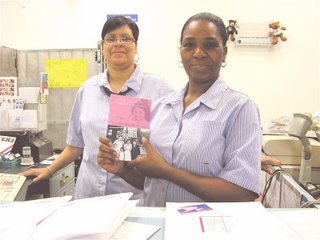
Meet Joanne Samuels and Zeta Horton-Tyler, two outstanding representatives of the U.S. Postal Service who are pictured at my neighborhood Daniel J. Doffyn Station on N. Kedzie Avenue. These women have enthusiastically helped me mail copies of THE DIVISION STREET PRINCESS to addresses throughout the U.S. and internationally.
Thinking about the postal service sparks this excerpt from THE DIVISION STREET PRINCESS:
“Summer days on Division Street children claimed our concrete playing field, but by early evenings, we’d relinquish a portion to our parents. The sidewalk in front of our store was the customary gathering spot. And since our block was made up of six- and twelve-flat apartment buildings -- absent of porches or stoops -- the adults, like their creative children, improvised.
‘Here, put them here,' Mrs. Levinson said to her husband Saul one evening that July, as she pointed to a spot to the right of our grocery’s front door. Rose Levinson was the apple of her husband’s eye, as well as of her three sons. Mr. Levinson, bulky as my dad, was schlepping four metal card chairs -- two for his wife and him, the others reserved for my parents.
On that evening, the Friedmans and the Rosenbergs soon joined the Levinsons on the sidewalk. Each newcomer carried a card chair that squeaked as it was unfolded. These were the same chairs that were stored flat in a hall closet, then opened weekly for rounds of Pinochle and Gin Rummy, or Canasta and Kalukee. This night, as our neighbors settled in on their metal chairs, the men unbuttoned shirt collars and lit unfiltered cigarettes, and the women fixed their eyes on their wild kinderlach on the concrete stage before them.
A few of the men, including my father, shunned chitchat and folded damp arms under heads, and leaned back against the brick building. Subdued by a day of labor, several helpings of heavy Jewish cooking, and gasoline fumes from the street, they schloffed. Nothing could rouse our dozing fathers -- neither the screams of their flying children, nor the sounds of radio programs that leaked from open windows overhead. The crackley broadcasts of The Goldbergs or The Jack Benny Show, with their familiar characters and easy going plots, lulled -- rather than disturbed -- the drained men.
This particular evening, my mother was unfolding a flimsy blue envelope and reading news of her four brothers who were stationed overseas. ‘Listen,’ she said, pulling on her girlfriend’s bare arm to catch her attention. ‘You’ll never believe what my brother Nate did. He’s in the Army Engineers, you know.’ Then, she smoothed the airmail letter in her lap and read, ‘One of my pals told me he had seen a guy named Elkin in a military hospital, and that the soldier had malaria. I figured it was our brother Carl, because I hadn’t heard from him in a few weeks.’ As my mother continued Uncle Nate’s airmail, Mrs. Levinson’s eyes darted from my mother’s face to her kids’-- as if she was watching a tennis match at Humboldt Park. When the ball returned to Mom’s court, she read on, 'So I went AWOL until I found Carl. The docs said he’s okay, just resting up till they send him home. But guess where I am?' Mother paused here for dramatic effect. When Mrs. Levinson failed a guess, Mom read, in a loud voice mixed with humor and surprise, ‘In the brig! I have to serve seven days, one for each day I was gone from my outfit.’”
No comments:
Post a Comment